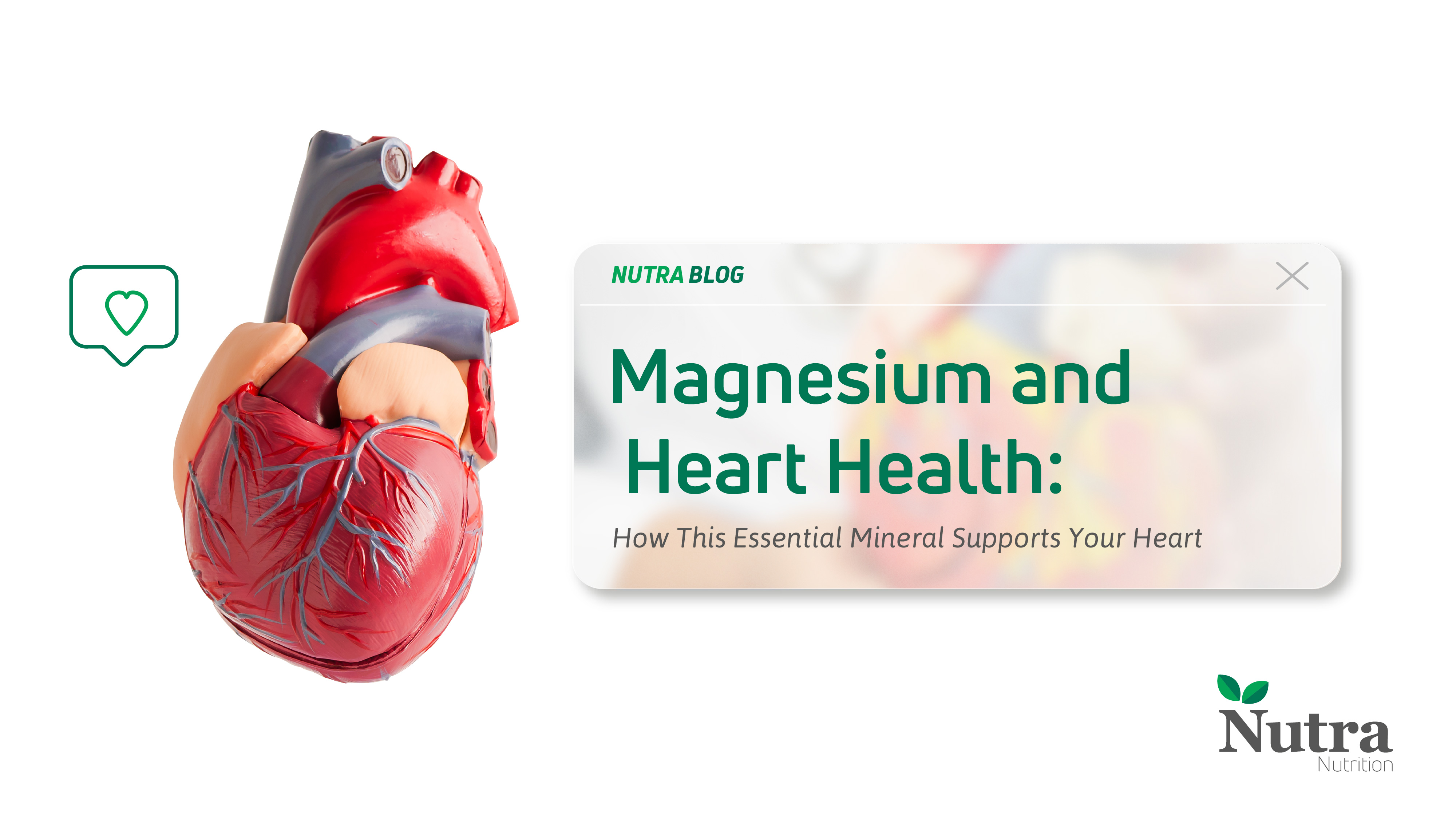Magnesium and Heart Health.
- Home
- Nutra Blog: Health and Nutrition
- Magnesium and Heart Health.

Magnesium and Heart Health.
Oct 31, 2024
By
Nutra Llc
0 comment(s)
Magnesium is a crucial mineral that our body needs to function well, especially when it comes to heart health. Many studies suggest that getting enough magnesium can help protect against heart conditions like high blood pressure, irregular heartbeats, and even heart attacks. Let’s look at why magnesium is so important for the heart and how it can be added to your daily routine.
Why Magnesium Matters for Your Heart
Magnesium plays a vital role in various body processes, particularly those that keep your heart working smoothly. It helps control blood pressure, maintains steady heartbeats, and keeps blood vessels relaxed for better circulation. When magnesium levels are low, heart problems are more likely to occur.
Key Benefits of Magnesium for Heart Health
- Blood Pressure Control: Magnesium can help lower blood pressure, especially for those with hypertension (high blood pressure). Daily intake of around 500 mg of magnesium has been linked to improved blood pressure and overall cardiovascular health (The Role of Magnesium i…).
- Supports a Healthy Heart Rhythm: This mineral helps maintain a regular heartbeat by balancing the heart’s electrical activity. Magnesium can be especially beneficial for those who suffer from irregular heart rhythms, known as arrhythmias.
- Reduces Heart Disease Risk: Magnesium provides essential support for long-term heart wellness by supporting blood pressure, heart rhythm, and blood vessel health (Clinical Cardiology—N…).
Choosing the Right Magnesium Supplement for Heart Health
When it comes to heart health, certain types of magnesium are more effective. Here are two popular forms to consider:
- Magnesium Citrate: This form is highly absorbable, making it ideal for supporting cardiovascular health. Magnesium citrate is also gentle on the stomach, helping reduce discomfort when taken regularly.
- Magnesium Glycinate: Another easily absorbed form, magnesium glycinate is known for its calming properties, which can also benefit overall heart wellness.
How Much Magnesium Do You Need?
The daily magnesium requirement varies by age, gender, and life stage. Here are the general recommended daily allowances (RDAs) for magnesium:
- Adult men (19-30 years): 400 mg
- Adult men (31 years and older): 420 mg
- Adult women (19-30 years): 310 mg
- Adult women (31 years and older): 320 mg
- Pregnant women (19-30 years): 350 mg
- Pregnant women (31 years and older): 360 mg
- Breastfeeding women (19-30 years): 310 mg
- Breastfeeding women (31 years and older): 320 mg
For children and teens, the amount ranges from about 80 mg to 410 mg per day, depending on age.
Magnesium can be obtained from foods like leafy green vegetables, nuts, seeds, whole grains, and dairy products. If considering supplements, it's a good idea to consult with a healthcare provider to ensure you're meeting, but not exceeding, the appropriate amount for your individual needs.
National Institutes of Health, Office of Dietary Supplements. (2022). Magnesium: Fact Sheet for Health Professionals. NIH.
Additional Benefits of Magnesium: Sleep and Stress Relief
Magnesium also plays a role in reducing stress and improving sleep quality. Known as the “calming mineral,” it helps the body relax, which is essential for both a healthy heart and overall well-being.
Magnesium-Rich Foods
In addition to supplements, magnesium-rich foods like leafy greens, nuts, seeds, whole grains, and fish are great sources. If getting enough through your diet is challenging, adding a supplement is an easy way to ensure you’re meeting your body’s needs.
At Nutra LLC, we know how vital magnesium is for your health journey. For high-quality magnesium supplements that support heart wellness and more, explore our range at www.storenutra.com.
References
- Fazekas, T. (1993). Magnesium and the heart: Antiarrhythmic therapy with magnesium. Clinical Cardiology, November 1993. Retrieved from NIH
- Houston, M. (2011). The Role of Magnesium in Hypertension and Cardiovascular Disease. The Journal of Clinical Hypertension, Wiley Online Library. Retrieved from NIH
- Gómez, M. N. (1998). Magnesium and cardiovascular disease. Anesthesiology, 89(1), 222-240. doi: 10.1097/00000542-199807000-00029. PMID: 9667312. Retrieved from NIH
*Disclaimer: Statements made, or products sold through this website, have not been evaluated by the United States Food and Drug Administration.
They are not intended to diagnose, treat, cure or prevent any disease.
